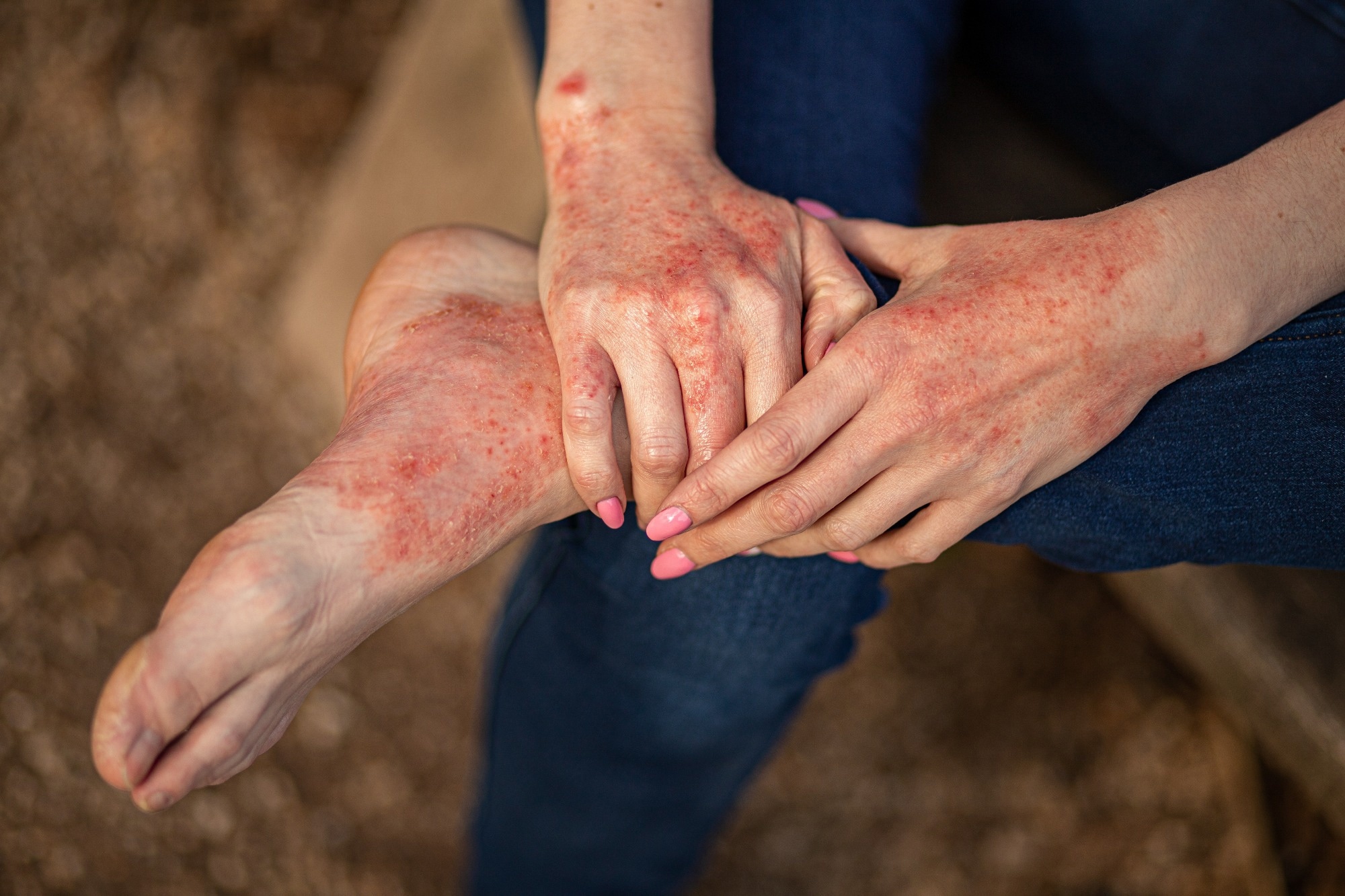Mediterranean diet supercharges skin treatment, clears up atopic dermatitis in teen
A case report of a patient with atopic dermatitis published in the journal Nutrients highlights the importance of healthy dietary regimens in reducing symptoms of atopic dermatitis.
 Study: The Role of the Western Diet on Atopic Dermatitis: Our Experience and Review of the Current Literature. Image Credit: IrinaFoto / Shutterstock.com
Study: The Role of the Western Diet on Atopic Dermatitis: Our Experience and Review of the Current Literature. Image Credit: IrinaFoto / Shutterstock.com
Background
A balanced diet with healthy foods plays a vital role in improving physical and mental health and reducing the risk of various detrimental health conditions, including cardiometabolic diseases. In contrast, unhealthy foods, which should be avoided or consumed in moderation, can potentially increase the risk of obesity, diabetes, and heart disease.
The consumption of a Western-style diet, often rich in processed or ultra-processed foods, sugary drinks, and animal products and low in fiber, vitamins, and minerals, is increasing worldwide. This is accompanied by a global increase in morbidity and mortality.
Ultra-processed foods are pro-inflammatory and have significant negative health effects. These foods can influence the gut microbiota and increase the abundance of pathogenic microorganisms responsible for inflammatory diseases. Real-world evidence indicates that ultra-processed foods can significantly increase the risk of cardiovascular and cerebrovascular diseases and all-cause mortality.
Dietary exposure also plays a vital role in triggering inflammatory skin diseases, including atopic dermatitis. This disease is characterized by recurrent itchy lesions that can significantly reduce an individual’s overall quality of life. The gut microbiota plays an important role in the development of atopic dermatitis by regulating the immune system maturation, especially in the early years of life.
Previous studies investigating dietary interventions for chronic diseases indicate that probiotics, prebiotics, vitamin and mineral supplements, and healthy dietary habits can be effective for treating and preventing atopic dermatitis.
Case report
The current study reported the case of a 14-year-old boy who presented with a six-year history of eczematous skin lesions in various body parts that were suggestive of atopic dermatitis. The patient was also experiencing asthma, sleep disturbances, and irritability. The patient was under long-term treatment with topical steroids and calcineurin inhibitors; however, no significant treatment effect was noted.
The clinical examination of the patient revealed an itchy eczematous eruption on the leg, as well as some small lesions on both the forearms and pinnae, as well as the patient’s face. The scratching of affected body parts resulted in a thin and sticky discharge. The patient reported experiencing an aggravation of symptoms at night and an improvement of symptoms with wet wraps.
Upon further examination, the patient also presented with type 1 obesity, a waist-to-hip ratio of one, and high fasting blood glucose. Based on these observations, the patient was diagnosed with metabolic syndrome. Furthermore, the dietary evaluation revealed that the patient primarily consumed a Western diet.
After enrollment, the patient was treated with dupilumab, which is a monoclonal antibody targeting interleukin 13 (IL-13) and IL-4. A partial improvement in lower limb lesions and a reduction in erythema, skin thickening, and itching were observed after eight weeks of the treatment. However, no significant improvement in the patient’s overall quality of life was observed at the first follow-up visit.
Nevertheless, dupilumab was continued, and the patient was eventually reevaluated after 18 weeks of the treatment. At this subsequent visit, the patient exhibited complete resolution of active lesions and absence of itching and sleep disturbance symptoms.
The patient continued to report hyperpigmentation in the upper limbs. Further clinical evaluations revealed a significant reduction in the patient’s body weight and fasting blood glucose level.
At the 18-week follow-up visit, the patient mentioned consulting a nutritionist one week after the first follow-up visit. The nutritionist prescribed a dietary regimen based on the Mediterranean diet, which was enriched with vegetables, fruits, and whole grains. The patient reported strictly following the prescribed diet.
Significance
The case report presented in the current study highlights the importance of dietary regimens in augmenting the therapeutic efficacy of monoclonal antibodies for managing inflammatory skin diseases like atopic dermatitis.
In addition to its cardio-metabolic benefits, the Mediterranean diet has well-established immunomodulatory activities. This case report reveals that dupilumab therapy in combination with a Mediterranean diet regimen is highly effective for the complete resolution of symptoms associated with atopic dermatitis.
- Ilaria, P., Ersillia, T., Nicoletta, B., et al. (2023). The Role of the Western Diet on Atopic Dermatitis: Our Experience and Review of the Current Literature. Nutrients. doi:10.3390/nu15183896
Posted in: Child Health News | Medical Research News | Medical Condition News
Tags: Antibodies, Antibody, Asthma, Atopic Dermatitis, Blood, Cardiometabolic, Chronic, Dermatitis, Diabetes, Diet, Efficacy, Erythema, Fasting, Glucose, Heart, Heart Disease, Hyperpigmentation, Immune System, Immunomodulatory, Immunotherapy, Interleukin, Mental Health, Metabolic Syndrome, Minerals, Monoclonal Antibody, Mortality, Nutrients, Obesity, Prebiotics, Probiotics, Skin, Sleep, Supplements, Syndrome, Vegetables, Vitamins

Written by
Dr. Sanchari Sinha Dutta
Dr. Sanchari Sinha Dutta is a science communicator who believes in spreading the power of science in every corner of the world. She has a Bachelor of Science (B.Sc.) degree and a Master's of Science (M.Sc.) in biology and human physiology. Following her Master's degree, Sanchari went on to study a Ph.D. in human physiology. She has authored more than 10 original research articles, all of which have been published in world renowned international journals.